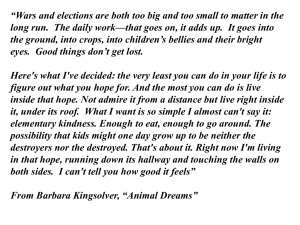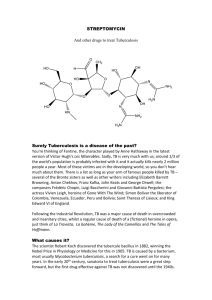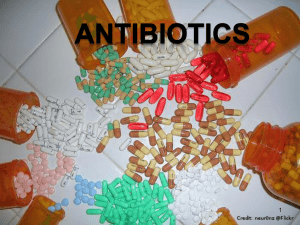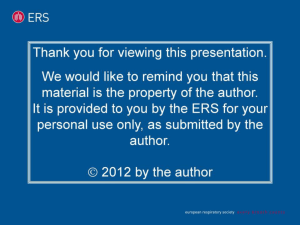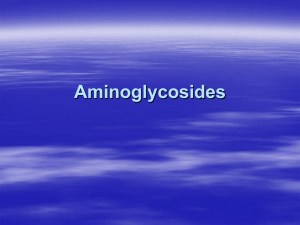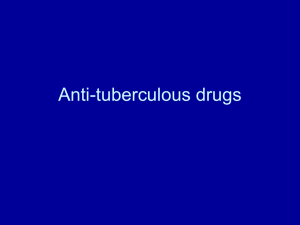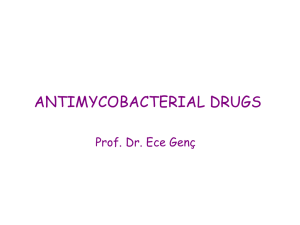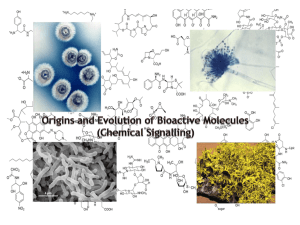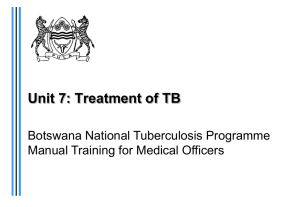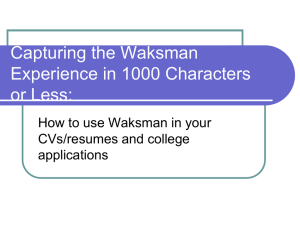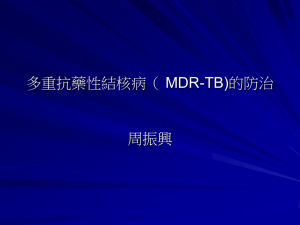Streptomycin
advertisement
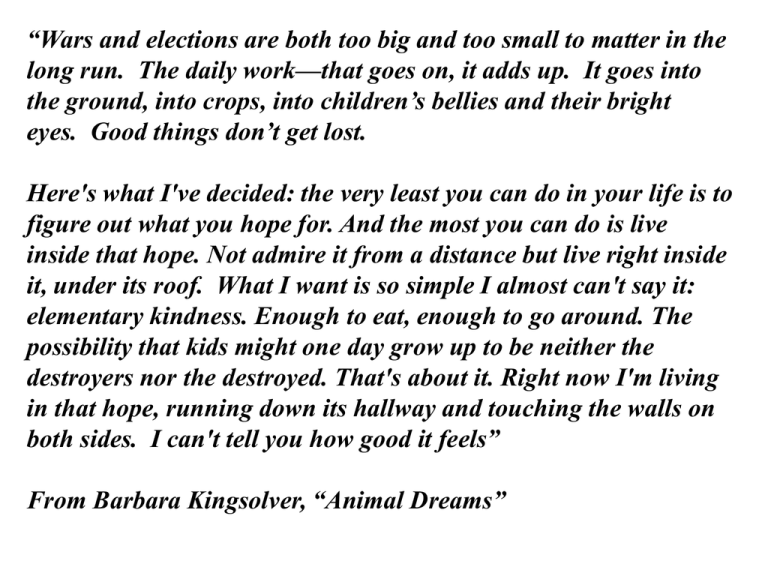
“Wars and elections are both too big and too small to matter in the long run. The daily work—that goes on, it adds up. It goes into the ground, into crops, into children’s bellies and their bright eyes. Good things don’t get lost. Here's what I've decided: the very least you can do in your life is to figure out what you hope for. And the most you can do is live inside that hope. Not admire it from a distance but live right inside it, under its roof. What I want is so simple I almost can't say it: elementary kindness. Enough to eat, enough to go around. The possibility that kids might one day grow up to be neither the destroyers nor the destroyed. That's about it. Right now I'm living in that hope, running down its hallway and touching the walls on both sides. I can't tell you how good it feels” From Barbara Kingsolver, “Animal Dreams” Despite Koch’s discovery, for 60 years the only treatment was isolation, “fresh air, and sunshine” www.umdnj.edu/librweb Waverly Hills Tuberculosis Sanatorium. Louisville KT 1926 Built in 1911, expanded in 1926, closed in 1961 So it was time for another Nobel laureate! Selman Waksman 1888-1973 He was working on bugs that live in dirt! Selman Waksman 1888-1973 He was working on bugs that live in dirt! A childhood immigrant from the Ukraine, through hard work He became a professor Of microbiology and biochemistry at Rutgers Selman Waksman 1888-1973 He was working on bugs that live in dirt! A childhood immigrant from the Ukraine, through hard work He became a professor Of microbiology and biochemistry at Rutgers He coined the term antibiotic and Discovered more than 20 Antibiotics, including two which Are widely used today. Neomycin--check your medicine cabinet Selman Waksman 1888-1973 He was working on bugs that live in dirt! Streptomyces griseus. Streptomycin He was working on bugs that live in dirt! Streptomyces griseus. Streptomycin Isolated on October 19, 1943 by Albert Schatz, a graduate student in Waksman’s lab He was working on bugs that live in dirt! the-scientist.com Streptomycin Isolated on October 19, 1943 by Albert Schatz, a graduate student in Waksman’s lab Bugs fight bugs Streptomycin kills many bacteria, including Mycobacterium Tuberculosis! Bugs fight bugs Streptomycin kills many bacteria, including Mycobacterium Tuberculosis! But how? The central dogma-anybody remember that? The central dogma-anybody remember that? DNA -> RNA -> Proteins The central dogma-anybody remember that? DNA -> RNA -> Proteins And we call that step? DNA -> RNA -> Proteins Translation! DNA -> RNA -> Proteins Bacteria do it too, and like us they use RIBOSOMES www.palaeos.com Let’s zoom in on the action Lovely picture from Harry Noller The ribosome is an amazing machine That unlike most in the cell runs on RNA! Lovely picture from Harry Noller The ribosome is an amazing machine That unlike most in the cell runs on RNA! 16S rRNA + proteins =30S or small subunit Lovely picture from Harry Noller If we zoom in further… Luckily, our ribosomes are slightly different and thus streptomycin affects them less 16S rRNA + proteins =30S subunit Lovely picture from Harry Noller Streptomycin cannot be given orally, but must be administered by regular intramuscular injection. An adverse effect of this drug is ototoxicity, i.e. It can result in temporary hearing loss. Streptomycin cannot be given orally, but must be administered by regular intramuscular injection. An adverse effect of this drug is ototoxicity, i.e. It can result in temporary hearing loss. Cool fact--this may be due to effect on Mitochondrial ribosomes!!! OK. So streptomycin kills bugs in a flask in the lab. What about inside a patient? First we have to make a lot of it. In steps George Merck of Merck and Co. First we have to make a lot of it. In steps George Merck of Merck and Co. And we got the patent… First we have to make a lot of it. In steps George Merck of Merck and Co. But we gave it back to Rutgers! Now we need to try it on animals. Enter Dr. William H. Feldman and Dr. H. Corwin Hinshaw at the Mayo Clinic Now we need to try it on animals. Enter Dr. William H. Feldman and Dr. H. Corwin Hinshaw at the Mayo Clinic In two months they reported to Waksman that four tubercular guinea pigs receiving streptomycin "look exceedingly well." We do, don’t we! OK, but how about people? Next Feldman and Hinshaw invent clinical trials www.jameslindlibrary.org OK, but how about people? Next Feldman and Hinshaw invent clinical trials OK, but how about people? Next Feldman and Hinshaw invent clinical trials This is really important!! OK, but how about people? In August 1945 Hinshaw reported that thirty-three patients had been treated "and [we] continue to be quite optimistic." Initially streptomycin appeared to be a miracle cure Patients, including the first, “Patricia T”, Were returned to health from death’s door Now the problem was scaling up (Remember 5 million people a year Were still dying of TB!) By 1948 8 companies were making streptomycin But their 80,000 pounds Would only treat 1000 patients Initially streptomycin appeared to be a miracle cure BUT….. A second, much worse Problem was now on the horizon By 1948 patients began to relapse! For example the author George Orwell But a second, much worse problem was now on the horizon In an MRC clinical trial, patients improved rapidly But within five years the death rate was the Same as the untreated controls Professor Hill of the MRC But a second, much worse problem was now on the horizon In an MRC clinical trial, patients improved rapidly But within five years the death rate was the Same as the untreated controls Uh, oh. Professor Hill of the MRC What was going wrong?? What was going wrong?? Streptomycin resistant bacteria could be cultured from these patients! What was going wrong?? Streptomycin resistant bacteria could be cultured from these patients! How could That happen? What was going wrong?? Streptomycin resistant bacteria could be cultured from these patients! How could That happen? Have you heard The one about Natural selection? What was going wrong?? evolution.berkeley.edu And how did this happen? evolution.berkeley.edu And how did this happen? evolution.berkeley.edu And how did this happen? evolution.berkeley.edu And how did this happen? evolution.berkeley.edu And how did this happen? Remember me? 16S rRNA + proteins =30S subunit Lovely picture from Harry Noller Occasional bacteria had variants in 16sRNA or the ribosomal protein S12 16S rRNA + proteins =30S subunit Lovely picture from Harry Noller These blocked binding of streptomycin to the ribosome and thus these bacteria were resistant! 16S rRNA + proteins =30S subunit Lovely picture from Harry Noller Thanks and kudos to Gary Trudeau for hitting the nail on the head So what now? So what now? Luckily, help was on the way from para-aminosalycilic acid (PAS) AND Jörgen Lehmann Lehmann started with a strange published fact The TB bug loves to eat aspirin (salicylic acid) Lehmann started with a strange published fact The TB bug loves to eat aspirin (salicylic acid) Lehmann started with a strange published fact The TB bug loves to eat aspirin (salicylic acid) His hypothesis: Alter aspirin slightly And the bugs will die trying to eat it Lehmann moved quickly, from bacterial trials in December 1943 To Guinea pig trials in January 1944 To the first patient in March 1944 (before streptomycin!!) Lehmann J. Para-aminosalicylic acid in the treatment of tuberculosis. Lancet. 1946; 1:15-6. Chest 1949;16;684-703 So how does PAS work? So how does PAS work? 50 years later we still don’t know for sure So how does PAS work? It is likely to act somewhere in the pathway For making nucleotides to make DNA http://themedicalbiochemistrypage.org So which is better: Streptomycin or PAS? So which is better: Streptomycin or PAS? BOTH! Remember this? I fear no streptomycin Remember this? I fear no streptomycin and PAS doesn’t touch me But if the same patient is given both drugs… I fear no streptomycin and PAS doesn’t touch me But if the same patient is given both drugs… Ahhhh…… No……… After this trial….. The two drug combination became The new standard But the story is not over yet-- we needed Another Nobel laureate But the story is not over yet-- we needed Another Nobel laureate I was already the 1939 Nobel laureate For discovering sulphanilamide The first antibacterial drug Gerhard Domagk Nobelprize.org But the story is not over yet-- we needed Another Nobel laureate I was already the 1939 Nobel laureate For discovering sulphanilamide The first antibacterial drug (though I was not allowed by the Nazis to accept the prize and I was held by the Gestapo for a week because of this honor) Gerhard Domagk Nobelprize.org But the story is not over yet-- we needed Another Nobel laureate I spent World War II in a bombdamaged hospital lab pursuing new chemical relatives of sulphanilamide that might be effective against TB Gerhard Domagk Nobelprize.org Here’s what I discovered Isoniazid Here’s what I discovered First we need to know more About mycobacteria Isoniazid All living cells Have a plasma membrane All living cells Have a plasma membrane Gram positive Bacteria also Have a cell wall All living cells Have a plasma membrane Gram positive Bacteria also Have a cell wall Mycobacteria have a Very complex cell wall Serving as a barrier http://web.uct.ac.za/depts/mmi/lsteyn/cellwall.html 1. 2. 3. 4. 5. 6. 7. 8. outer lipids mycolic acid polysaccharides (arabinogalactan) peptideglycan plasma membrane lipoarabinomannan (LAM) phosphatidylinositol mannoside cell wall skeleton Wikipeda/mycobacterium Just look at the parts list 1. 2. 3. 4. 5. 6. 7. 8. outer lipids mycolic acid polysaccharides (arabinogalactan) peptideglycan plasma membrane lipoarabinomannan (LAM) phosphatidylinositol mannoside cell wall skeleton Wikipeda/mycobacterium Just look at the parts list Isoniazid is metabolized by the bacterium To isonicotinic acyl anion or radical and inhibits the enzyme that makes Isoniazid was added to the combination therapy and remains there today! Isoniazid was added to the combination therapy and remains there today! Streptomycin and PAS were removed from frontline therapy as new drugs that were more effective or had fewer side effects came into the clinic Current first-line TB drugs and their dates of discovery National Institute of Allergy and Infectious Diseases (NIAID) 2007 NIAID (2007) Let’s look at one of the new drugs in detail rifampicin It binds the ß subunit of RNA polymerase rifampicin Cell. 2001 Mar 23;104(6):901-12 Check out a cool video view at http://www.pingrysmartteam.com/rifampicin/rifampicin.htm Binding does not block recruitment to the promotor But inhibits transcription elongation after 2-3 nucleotides are made by sterically blocking transcript elongation Cell. 2001 Mar 23;104(6):901-12 Let’s take a closer look Cell. 2001 Mar 23;104(6):901-12 Most mutations that confer rifampicin resistance change Residues in the binding pocket Our RNA polymerase is different enough that it is not inhibited by rifampicin Cell. 2001 Mar 23;104(6):901-12 First-line TB drugs Left to right isoniazid, rifampin, pyrazinamide, & ethambutol Streptomycin (not shown) is given by injection CDC First-line TB drugs 4 drugs, 130 doses Over 6-9 months! TBAlliance First-line TB drugs 4 drugs, 130 doses! Daily dose! http://www.mcvay.com/tb_treatment_in_the_western.html TBAlliance First-line TB drugs Are also not compatible with Antiretroviral HIV therapy (problem for 1/3 of HIV patients!) Rifampin induces cytochrome p450s, Increasing metabolism of anti-HIV drugs TBAlliance Remember the difference in TB rates world-wide but CDC The other major challenge Is multi-drug resistant TB CDC Remember this story??? In other word MDR TB says I fear none of the First line drugs! What drives drug resistance? Incorrect, unsupervised, or incomplete treatment The answer in the developed world: The answer in the developed world: MORE DRUGS! NIAID (2007) NIAID (2007) New TB drugs under development NIAID (2007) And the future beckons Nature 393, 537-544(11 June 1998) In 1998 the Sanger centre and the Pasteur Institute Determined the complete genome sequence Of M. tuberculosis Nature 393, 537-544(11 June 1998) 4.4 million base pairs About 4000 genes Remarkable diversity Of genes involved in fatty acid Synthesis and metabolism (>250 genes) Nature 393, 537-544(11 June 1998) Remarkable diversity Of genes involved in fatty acid Synthesis and metabolism (>250 genes) Nature 393, 537-544(11 June 1998) The genome provides new targets for drugs and vaccines Nature 393, 537-544(11 June 1998) But in the developing world….. Stats from WHO; slide from TBAlliance
